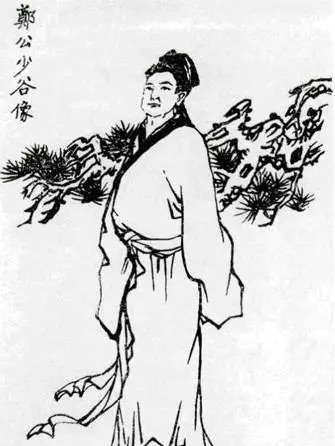
Zheng Shanfu (1485-1523), also known as Shaogu, was a native of Min County (present-day Gaishan, Cangshan, Fuzhou), a Ming Dynasty official and Confucian scholar.
The picture shows No. 3 Aofengfang
Today's former residence of Gao Shiqi, No. 3 Aofengfang, is actually a Ming Dynasty building, while its owner was Zheng Shanfu four or five hundred years ago.
Zeng Yidan used the "spirit of hard bones" to describe Zheng Shanfu's temperament in his "Fuzhou Ancient Home".
Because of his integrity, Zheng Shanfu offended many people in the official field, and then he was disappointed in his career and asked him to resign and return to his hometown.
After returning to his hometown, Zheng Shanfu built a grass hall under Jin'ao Peak (now Yushan AofengFang), which was not far from the home of his friend Fu Ruzhou, and he also gave a name called "Shaogu Caotang".
Zheng Shanfu calligraphy works
There is a record of Zheng Shanfu in the "Biography of Ming Shi Lie", saying that after he returned, he "built the grass hall under the peak of Jin'ao, for Chi Qingting, and read it, that is, the Qingye of the World".
It can be seen that although Zheng Shanfu is in Lin Quan, he is still worried about the country and the people.
Zheng Shanfu lived at home for 6 years and Zhengde for thirteen years, and the imperial court issued an edict asking him to return to Beijing and serve as the chief of the Qing Officials of the Ceremonial Department. Fourteen years of promotion to foreign groom. The eunuch Jiang Bin was favored, and Emperor Wuzong repeatedly took him out on tour of, and even traveled to Changping in micro-clothing. The emperor called himself "the governor of the military affairs and the mighty general of the general", and greatly lost the imperial court system. In March, the emperor issued a decree to prepare for the southern tour, but the courtiers were obstructed by the emperor, and some of the counselors were arrested and imprisoned, and some were killed by the staff. Zheng Shanfu was also punished for kneeling at the noon gate for advice, and prepared the court staff.
But the hard-boned Zheng Shanfu was not afraid of death, and before receiving the staff, he neglected to give advice again, and the good husband took this neglect in his arms and told his friend, "If I die, I will go to this neglect." Fortunately, thanks to the thirty scepters received by the good husband, the emperor still took Jiang Bin on a trip. Seeing that the situation was getting worse and worse, Yoshio was irreparable and indignant, so he asked for his resignation on the grounds that "the cold and evil were invaded, and the head was breathing". At first, he did not get accurate, but later he was connected to the second place, and the imperial court approved him to return to Li.
Zheng Shanfu's poetry achievements are very high, together with Li Mengyang, He Jingming and others in politics against eunuchs chaotic government, most of his poems are works of anxiety and sentiment, such as the author of the 25 volumes of "Shaogu Collection", "Talking about the World", "Poor Girl Yin", "Kou Zhi", etc., which played a role in the Fujian literary circles of the Ming Dynasty.
Zheng Shanfu inkblot
Zheng Shanfu is erudite and versatile, can write and paint, is proficient in Zhou Yi, and has written "Yi Theory", "River Tuluo Book", "Honghua Theory" and so on. In addition to writing poetry and reading, he has a deep study of mathematics and calendar. In mathematics, he is the author of "Nine Chapters of Multiplication and Division" and so on. In the fifteenth year of Zhengde, through the investigation and study of celestial signs, calendars, solar eclipses and lunar eclipses, he deduced that there were errors in the calendar at that time, put forward suggestions for amendments, and wrote "Changing the Calendar Yuanshu", "Daily Su Routine", "Moon Su Case" and so on.
In the first year of Jiajing (1522), Emperor Sejong ascended the throne, and he used Shanfu as the Nanjing Punishment Department Langzhong, and soon transferred to the Official Department inspection and sealing department. In the autumn of the second year (1523), Shanfu went to Beijing, traveled to Jianning, and stopped by to visit Wuyi Jiuqu, when he suddenly encountered wind and snow and starved of food, and fell ill in the wind and evil, so he returned to Fuzhou. He died only two days later, nine Chinese New Year's Eve. Because he was a clean and honest official and did righteousness for others, he had no surplus wealth in his family.
Source: Minhou County Discipline Inspection Commission Supervision Committee, Qingfeng Fuzhou
03